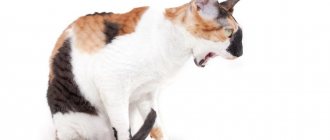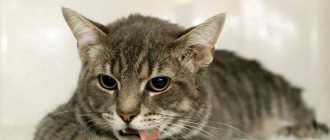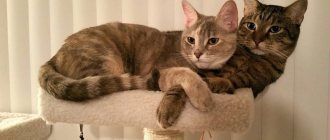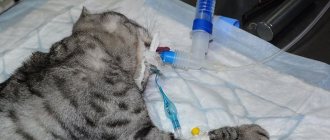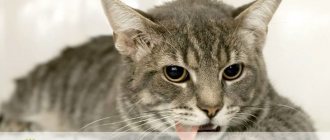The occurrence of vomiting in pets is a signal of problems in the body systems. The eruption of gastric contents is a kind of defense mechanism that arises as a result of many factors.
Representatives of the cat family have a remarkably developed part of the brain responsible for vomiting attacks. Sometimes the owner notices a phenomenon where the cat vomits foam or undigested food particles.
The gag reflex occurs as a result of the simultaneous contraction of the muscle fibers of the abdomen and diaphragm, changing intra-abdominal pressure. As a result of muscle contraction, food from the stomach rises sharply up the esophagus.
Vomiting is a defensive reaction, so it should not go unnoticed by the owner. It is important to understand the reasons that caused vomiting and only then prescribe treatment. It is quite problematic to independently identify the cause of vomiting in a cat and you cannot do without qualified help from a specialist.
What does vomiting indicate?
Two situations must be distinguished. If a cat vomits once and does not recur, while the pet does not lose appetite and does not experience other alarming symptoms (such as diarrhea and changes in behavior), then this is not a very dangerous situation; most likely, this is a one-time reaction of the body (about the possible reasons for this We'll tell you a little further).
It’s a completely different matter if the cat vomits more or less regularly (three times a day or more often) and at the same time the general condition of the whisker changes: it stops eating (sometimes drinking) and becomes less mobile. This already indicates that not everything is in order with the body; this is a clear symptom of serious health problems. In this case, the owner must urgently contact a veterinary clinic.
Recommended Treatment
Depending on the reasons that provoked the cat’s vomiting, further therapy will depend. When contacting a qualified doctor, it is necessary to carry out an accurate diagnosis, including laboratory tests and instrumental studies (complete blood count, ultrasound, biochemical analysis of vomit).
Based on the data obtained, appropriate treatment will be prescribed, taking into account the individual characteristics of the pet.
When a cat vomits due to overeating, dietary adjustments are necessary. It is recommended to give food to your pet more often, but in small portions. This will avoid overstretching the stomach walls and prevent vomiting.
Frequent and severe attacks of gastric eruption are stopped with intramuscular injections of drugs such as Cerucal and No-shpa. Enterosorbenes – Enterosgel or Atoxil – are used in complex treatment.
Every pet owner should know what to do if their cat vomits before being examined by a doctor. First of all, it is recommended to put your pet on a starvation diet, excluding all types of food for at least 8 hours. Remove the food bowl, but make sure clean drinking water is freely available. This is due to the fact that the process of eruption of gastric contents is always accompanied by dehydration.
When a cat begins to vomit, it is important to closely monitor the general condition of the animal, noting the presence of other possible symptoms. In any case, even with a single vomiting, it is advisable to visit a veterinarian and rule out dangerous diseases.
"Dangerous" vomiting
Let's look at the most common - and most alarming - reasons why a cat vomits.
1) Infections
This is one of the most common causes of vomiting. And first of all, it is worth highlighting panleukopenia. This is a viral disease (the so-called “feline distemper”) with a very high mortality rate. The main method of infection is contact with an already sick animal (cats can also become infected from dogs) or its secretions. But the virus can also be transmitted by blood-sucking insects or can be carried by the owner on shoes, so even exclusively pets, if they are not vaccinated, are not 100% protected from panleukopenia.
Read about the disease: What is panleukopenia in cats
If your kitten is vomiting frequently, accompanied by diarrhea and refusal to eat, then it is better to play it safe and immediately contact a veterinary clinic. Then either you will make sure that the most dangerous cause of the painful condition is absent, or you will begin to treat the infection at an early stage, when there is a good chance of saving your pet. You should be especially concerned if the cat is not vaccinated.
2) Gastrointestinal diseases
An equally common cause is inflammatory processes in the gastrointestinal tract. These are diseases such as gastritis, gastroenteritis, colitis, pancreatitis, etc. All of them are accompanied by vomiting, often mixed with bile. Lack of treatment will lead to the death of the pet.
Read more about intestinal diseases: Treatment of intestinal diseases in cats
3) Poisoning
Of course, various poisonings can also cause vomiting in a cat: stale food, chemicals, medications - the latter is especially important if the owner is self-medicating, so we once again warn you against this. Needless to say, poisoning leads to acute intoxication of the body and, if the pet is not urgently provided with help, severe consequences, including death, are possible.
4) Brain problems
Perhaps this is not the most common reason why a cat vomits, but in terms of the degree of danger it is not inferior even to viral infections. Problems can arise due to head injuries with consequences such as concussion, edema, and increased intracranial pressure. Viruses or bacteria can also enter the brain and cause encephalitis and/or meningitis, both of which cause severe vomiting.
5) Volvulus, intestinal obstruction, etc.
An obstruction may occur, for example, due to a large hairball or small bones stuck in the intestines. In this case, only surgery will help.
6) Helminths
Another cause of vomiting is poisoning by waste products of worms. Large amounts of worm feces release toxins that are harmful to the cat.
Read more about the problem: What are helminths in cats
7) Vomiting during pregnancy
If during pregnancy a cat vomits for more than two weeks and the vomiting is accompanied by a decrease in temperature, diarrhea, and dehydration, this may be an acute pathology of some disease. The owner needs to contact the clinic as soon as possible to avoid serious consequences for the mother and fetus.
Thus, vomiting can indicate many pathologies. But among those listed above there are none that can be ignored without consequences. In other words, repeated vomiting, especially if it is accompanied by other alarming symptoms, should prompt the owner to immediately contact a specialist to establish an accurate diagnosis and begin treatment.
What to do if your kitten vomits
Every owner whose pet is experiencing a similar problem asks the question - what to do if the kitten vomited, how to provide first aid?
If the urge to vomit is repeated frequently, each is accompanied by vomiting, the body temperature is changed, the kitten vomits yellow or white liquid for several hours, droplets of blood are possible in the discharge and there is a complete refusal of food and water, then only a veterinarian can help.
After the tests, the veterinarian will prescribe therapeutic therapy, which includes the following treatment methods and medications.
1. Antiemetics.
2. To eliminate spasms and pain, an anesthetic is used.
3. If there is a lack of fluid in the body, saline solutions are needed.
4. Provided that the cause of vomiting is the spread of infection, antibiotics are prescribed, which will be used as injections into the muscles.
5. If worms are detected by a veterinarian, anthelmintics are prescribed accordingly.
What to do if the kitten vomited only once, and there are no other symptoms of serious pathologies or poisoning? In this case, the pet owner will be able to provide first aid independently. It is advisable not to feed your pet for half a day (about 12 hours). Every one and a half to two hours you should give the kitten clean water. If the pet is very young, a syringe without a needle can help.
After the kitten’s health improves, it will begin to “come to life” and show its characteristic interest in the environment and food, as soon as you give it a small amount of food. You can feed your little friend low-fat chicken meat, broth, rice broth, or specialized medicinal food. After a day, you can return to your usual diet. It is imperative to exclude foods that are harmful to the baby’s health – smoked, fatty, sweet, salty.
It is important to remember that for any reason of vomiting, you should not load the kitten’s gastrointestinal tract with food, but give it a rest for 12-14 hours.
When vomiting is not dangerous
Of course, we don’t want to say that absolutely any case of vomiting is a reason to break out in sweat and start trembling for your pet. Yes, it’s better to play it safe than to rely on chance. But, as we noted above, we need to look at the regularity/frequency of vomiting.
It happens that a cat’s gag reflex occurs only once or twice throughout the day and does not repeat. At the same time, she does not lose her appetite, she does not vilify, and her behavior does not change. Such vomiting is not dangerous for our little brothers and can be caused by the following reasons:
- Overeating - excess food puts pressure on the stomach diaphragm, resulting in a gag reflex. In this case, undigested pieces of food are visible in the vomit. To stop vomiting in a cat, it is enough to reduce the serving size. Moreover, this is necessary, since overeating will sooner or later lead to obesity, and it provokes many serious diseases, including cardiovascular disease and diabetes.
Read about the dangers of obesity: Fat cat - the dangers of excess weight for your cat
- Fasting - in this case, vomiting occurs in a cat who receives food once a day. This diet is not suitable for small predators. They should eat little but often. In this case, the vomit will consist of gastric mucus and foam. By changing the number of meals and its volume, you can stop vomiting.
— Accumulation in the stomach of a small amount of hair that comes from “washing” the cat. A hairball will be visible in the vomit. To make it easier for your pet to get rid of fur in his stomach, buy him a special herb or paste for removing hair.
Read more: Why do we need grass for cats?
— During pregnancy, hormonal changes occur in the expectant mother’s body (and the enlarging uterus puts pressure on the stomach), but the stomach quickly adapts, and vomiting no longer occurs. This mild vomiting lasts no more than 10 days, usually in the morning, and consists of light discharge, undigested food and a small amount of foam.
— A cat can get seasick when transported in any vehicle.
But if a kitten vomits (even just once), contact a specialist immediately, because vomiting weakens and dehydrates the body, which can lead to the death of the animal.
How to understand that the body is dehydrated
The Murkoshi team of specialists would like to draw your attention to the fact that the danger of vomiting for a kitten lies, among other things, in dehydration and imbalance of water and electrolyte balance. The number of ions responsible for the transmission of nerve impulses decreases, and as a result, the functioning of the cardiovascular, nervous and other body systems deteriorates.
You can determine dehydration in the following way: take the skin on the withers with two fingers, lift it and release it. If the skin does not immediately return to its normal position, but remains stuck together, it means the cat is dehydrated. The condition of the wool also changes when dehydrated - it becomes dry and does not shine (dull).
How does a cat behave before vomiting?
Vomiting is usually preceded by nausea, which is expressed in the animal's restless behavior and erratic movement from place to place. Excessive salivation and licking are often observed. The cat constantly makes swallowing movements and sometimes begins to meow.
After a while, he begins to sharply clear his throat, and then tilts his head and pulls it forward. Breathing becomes deep and rapid. After this, contractions begin in the abdomen and throat. Vomiting occurs. What to do if vomiting is frequent?
How to help a kitten?
If your kitten is vomiting frequently, adoption experts recommend contacting your veterinarian immediately. The same should be done if the vomit contains bile, blood, worms, or a large amount of mucus. The clinic will measure your temperature so as not to miss any serious changes in your body. With infectious diseases and inflammatory processes, the temperature will rise. In case of poisoning and shock - decrease.
It is necessary to understand that vomiting is not a disease, but in most cases a sign of some disease. Therefore, it is necessary to identify the cause of the cat’s vomiting, and this can only be done by a specialist.
Before visiting the veterinary clinic, remember what you fed your pet. Perhaps you replaced one food with another or there was contact with another animal. Take a good look at what the vomit consists of, as well as its color. Tell your doctor about this.
Self-diagnosis
The appearance of vomiting and the behavior of the kitten cannot make a final diagnosis, but the owner can assess the general condition of the animal and make a preliminary decision on its treatment. If something changes later, the decision may need to be revised.
© shutterstock
Encouraging signs
You don’t have to worry too much and limit yourself to home treatment if the following easily noticeable signs are observed:.
- The kitten vomited undigested or poorly digested food once - this happens from overeating.
- The kitten behaves actively, does not refuse water and food, and no additional symptoms are observed.
- It was possible to see fur in the vomit.
- The kitten recently arrived in the house and vomiting is not accompanied by a refusal of water, convulsions, or an increase in temperature - most likely, the unusual diet is to blame. It’s worth analyzing it and asking the cat’s owner what kind of food the kitten previously needed.
It is almost certain that if such symptoms are present, the vomiting will stop quickly and there will be no consequences. If the symptoms persist, the help of a veterinarian will still be required.
Threatening symptoms
But there are signs when it is better to immediately seek advice from a specialist..
- A kitten vomits blood - a sign of mechanical damage to the esophagus or stomach or severe internal pathologies.
- Vomiting occurs repeatedly, and bile is present in the mass (it is yellow) - serious disturbances in the functioning of the liver and bile ducts are possible.
- There is white foam in the vomit - this may indicate infection.
- Worms were found in the mass - they should be removed immediately.
- Vomiting is accompanied by diarrhea - a sign of poisoning.
- A kitten refuses to eat and does not drink - a threat to life, whatever the reason.
- Vomiting is accompanied by convulsions, apathy, and fever.
Yes, kittens can vomit (just like children) for minor reasons, “in the mood.” But, if the owner notices at least some threatening signs, he should immediately begin to treat the animal, because otherwise it may be too late.
Treatment
At the clinic, a doctor examines a patient. If the cause is poisoning, he will put in a drip with glucose solution or Ringer's solution. This will perfectly relieve the symptoms of intoxication in the body. If it is necessary to protect the mucous membrane from irritating factors, the specialist will use gastroprotectors.
In cases where the cause of vomiting in a kitten is infection or severe damage to the gastric mucosa, antibiotics or antiprotozoal drugs are prescribed.
If a cat vomits due to problems with the gastrointestinal tract or poisoning, it is advisable to put it on a therapeutic diet during treatment and for several days after it, adhering to simple rules - feed it in small portions several times a day. You may also need to water your pet in small amounts (even a large amount of water can cause the kitten to vomit), that is, often, but in small volumes. On the recommendation of a doctor, water can be replaced with sorbents - Regidron, Atoxil, etc.
Possible reasons
Only a specialist can determine the cause of vomiting in a kitten with scientific accuracy. But in some cases it is permissible to wait to contact him; An unpleasant phenomenon may have quite trivial reasons.
© shutterstock
Vomiting in a small kitten
If a small cat lives with a mother cat and feeds on her milk, there are few reasons for vomiting, but they are quite serious. Vomiting can occur if the cat itself has eaten something inappropriate or poisonous, with congenital pathologies, and with drug treatment of the cat.
When a very small animal begins to feel sick, it is better to consult a veterinarian - babies are very weak, and any illness is difficult to bear. It is also better not to treat a nursing cat with medications unless absolutely necessary.
Vomiting in a kitten older than 1.5 months
At this age, animals are usually transferred to permanent owners, taken away from the cat. If vomiting occurs during this period or later, there may be several reasons :
- stress (a kitten is the same as a child, and children often feel sick from fear or fatigue);
- sudden change of food;
- overeating (the new owners feed the furry “acquisition” with goodies);
- inappropriate food (the kitten should not eat fatty, salty, smoked or fried foods);
- poisoning;
- accumulation of hairballs in the stomach (typical of long-haired breeds, as well as British and Russian blue cats, which are fluffy in childhood);
- parasite infection;
- infection;
- disturbances in liver function;
- stomach diseases;
- foreign objects entering the stomach or esophagus (a kitten can easily eat a piece of paper, a piece of polyethylene or something similar).
You can understand the reason by the kitten’s behavior and the nature of vomiting. Depending on the findings, you should either do something yourself or quickly call a veterinarian.
